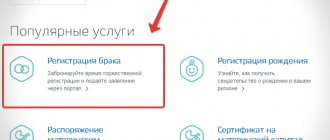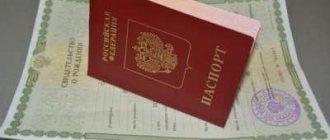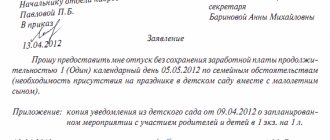Parents do not always want to send their child to the school that is located next door. And, often, they are refused on the basis of the Order of the Ministry of Education of the Russian Federation of 2012 on the procedure for admitting citizens to school . It contains the main criterion for selection into a general education institution - registration of the child.
Dear readers! The article talks about typical ways to resolve legal issues, but each case is individual. If you want to find out how to solve your particular problem , contact a consultant:
+7 (499) 938-81-90 (Moscow)
+7 (812) 467-32-77 (Saint Petersburg)
8 (800) 301-79-36 (Regions)
APPLICATIONS AND CALLS ARE ACCEPTED 24/7 and 7 days a week.
It's fast and FREE !
You can hear the following wording from school administration employees: “Children are admitted to the school assigned to the territory of residence.” That is, according to registration.
But rarely, who knows that the continuation of the quote from the Order of the Ministry of Education and Science of the Russian Federation sounds as follows: “From August 1 of this year , children who are not assigned to a school, but if there are places available,” can be admitted.
This means that you need to ask in advance if there are free places at the school.
And it’s best to submit an application in advance, justifying your position by the fact that according to the law, the school administration does not have the right to refuse parents to accept documents if there are free places.
What it is
Registration is an outdated legal concept. Currently, this word is used only colloquially; it has no legal basis.
By habit, registration at the place of residence is called registration. Although for almost a quarter of a century this word has been removed from the legislation of the Russian Federation.
Registration at the place of residence can be:
- permanent (at place of residence);
- temporary (at the place of stay).
Children are registered with their parents from 0 to 14 years of age . Parents of a newborn, having received a Birth Certificate, can already register the child.
Registration for a newborn
In the Russian Federation, newborn children are registered at the place of residence of one of the parents. In most cases, this is the mother's place of residence. For registration, the child is entered into her document and, thus, minors acquire a place of registration. It may not coincide with your actual place of residence.
Registering a newborn at the mother’s place of stay is one of the best options. If the mother does not refuse, then the child will remain with her until the age of 14, when it will be possible to obtain his own passport and choose a place of registration.
Registration of a newborn at the mother’s place of residence is the only option that will not cause restrictions on admission to school and kindergarten if they are in her area of residence.
According to the law of the Russian Federation, if any citizen moves to another city or region, he must register there. This will be temporary registration if a return is planned, or permanent if the move is permanent. Documents for registering a child at the place of residence are submitted by parents to the relevant internal affairs authorities (usually it is called a “passport office”). It should be:
- passport of one of the parents at whose place of residence the child will be registered (most often, as we said, this is precisely the registration of the newborn at the place of residence of the mother);
- child's birth certificate.
It is also possible to issue a separate certificate for the child, that is, registration of minors is issued in a separate document and only upon presentation by the parents of their birth certificate.
Legislation
The Federal Law “On Education” does not exclude the territorial principle of selection, that is, by registration. Article 67 of the law formulates the basic principles for the reception of children.
Preference for admission is given to children who live and are not registered in the territory assigned to the school.
But even then, you may be denied if there are no places available, with some exceptions. Children living in another area will be admitted to school only in second place.
What laws protect the right of children to study outside their registration?
Let's consider three legal acts:
- Constitution of Russia Article 5 and 43;
- Federal Law “On Education in the Russian Federation” No. 273, Article 67, paragraph 3;
- Letter from the Ministry of Education of the Russian Federation from 1999 “Recommendations for the education of children of refugees and migrants.”
All regulatory documents can be combined.
The main theses are:
- condition - availability of free places;
- preference is given to those who are registered at their place of residence or stay.
In order to have more chances, the application must be submitted in advance.
Do schools have the right not to admit students at their place of registration?
Parents must clearly understand the following: absolutely all schools are registered in certain microdistricts, which they are obliged to serve, therefore any child living in the area assigned to the educational institution has every right to attend it, even if there are not enough places there.
No one has the right to refuse you, otherwise this can be interpreted as a “direct violation of the right to receive free education” (excerpt from the Constitution of the Russian Federation).
Why do many schools provide completely unfounded reasons for not accepting your child? It's simple: such educational institutions rely on bribery on an especially large scale, which, as we know, is another violation of the norms of the Constitution. Especially often, such situations arise in prestigious educational institutions, where all conditions for comfortable learning have been created (extracurricular clubs, highly qualified teachers, free sports complex, etc.) It is quite difficult to get into such educational institutions, but you should still try and insist on your own.
Lack of a bribe is the main reason for “refusal” of admission to school
Law on the admission of children to general education institutions
The admission procedure is established by the legislation of the Russian Federation, as well as local and regional regulations.
Admission rules and benefits are regulated not only by the Law “On Education” .
The admission procedure is based on ensuring compulsory education.
An order of the Ministry of Education and Science from the beginning of 2014 approved the procedure for admitting children to general education institutions.
According to the document, admission can be denied only if there are more applicants to the school than there are places.
If there are no places, the child’s parents must contact the local administration regarding placement in another school.
You need to contact the executive authority that heads the education sector.
What is the probability of acceptance
If we summarize the cited regulations, it turns out that the main selection criteria (without affecting exceptions) are the availability of places and residence at the place of residence. These conditions are equivalent.
Residence does not have to mean registration at the place of residence; it can be a temporary option.
Documentary proof of residence in the territory that belongs to the desired school is required. How, otherwise, can you prove the truth of your words?
In practice, the administration conventionally divides children entering school into several categories.
- First of all , they take those whose permanent registration coincides with the boundaries of the coverage of this educational institution.
- The second is for those who live and are temporarily registered here.
- Further - according to desire and availability of free places.
Required documents and admission procedure
In order for a child to be accepted into 1st grade, you need to collect the following documents:
- birth certificate;
- an application filled out by one of the parents;
- passport of the parent who filled out the application;
- child's medical record in form 0-26/U ;
- document confirming the place of registration.
The application in accordance with the Order of the Ministry of Education and Science can be submitted electronically. an example here.
The application (regardless of the form) contains the following information:
- Child's full name;
- Date and place of birth;
- Full name of parents;
- address;
- parents' telephone numbers.
The papers along with the application must be taken to the school. After the decision to accept the child, a psychological study will follow to determine the child's abilities.
Applications for 1st grade are accepted in schools from approximately February to early July .
All documents and their copies are recorded in a journal. Parents receive a registration number and a receipt for receiving documents. Orders for admission to school are posted on special information boards on the day of its release. A personal file is opened where all documents are stored.
Whether it is possible to obtain registration at a dacha plot is written in the article: registration at a dacha. Don’t know what documents you need to prepare for temporary registration at the place of residence of Russian citizens? See about it here.
List of required documents
Documents play an important role in the question of how to enroll a child in school without registration.
Therefore, it is necessary to familiarize yourself and prepare the entire list of papers in advance.
To register a child for first grade, parents will need the following documents:
- birth certificate;
- personal documents of parents;
- relevant statement;
- certificate 0-26/U;
- extract from the place of registration;
- medical card.
These papers (except for the application) can be provided in the form of copies. Many schools arrange interviews with a psychologist for children. If this is a gymnasium or lyceum, then it is possible that the child will take entrance tests.
.
How to get there without registration
Sometimes the school that parents choose is far from their place of registration. We will tell you further about how you can get there.
What can help
If you want to enroll your children in school without registration, you must:
- Submit your application as early as possible.
- Prepare a description.
If the child did well in kindergarten and has some diplomas, then this can be an advantage.
- Apply to several schools you like.
- 5-7 days after receiving a positive response, immediately confirm your consent.
Some use tricks. To be in second place when entering school, parents apply for a temporary registration for their child. Until the age of 14, this can only be done at the place of registration of the parents.
For military personnel
According to the Federal Law of the Russian Federation of 2009 No. 34 “On the status of military personnel ,” which came into force in March of the same year, children of military personnel are given places in schools as a matter of priority.
By the way, not only in schools. Children of military personnel have an advantage when enrolling in kindergarten, as well as in summer camps.
How to enroll your child in school in another city
In order to place a child without registration in another city, you need to contact the local administration department, which manages general educational institutions. They will help you choose the best option for your place of residence.
Do not forget that despite the lack of permanent registration, they do not have the right to refuse you.
But there may be no places left in schools for those who do not have any registration. And this is already a good reason for refusal. Therefore, it is best to apply for temporary registration using Form-8 . It will take no more than a week.
By law, documents are required to be issued within 6 days .
How to enroll a child in a school other than his/her registration?
In order for a child to be enrolled in school, it is necessary to document his residence in the microdistrict related to the school . To do this, you need to contact the Managing Organization servicing the house or the passport office and, based on the permanent/temporary registration of the child, receive the appropriate certificate.
If you rent an apartment, make sure that the rental agreement drawn up with the landlady mentions your schoolchild. This document will also serve as evidence.
The application for admission to the school is filled out in a standard form . As a rule, it is written by hand by the parent to the director of the educational institution, indicating the date and with a signature. The text of the application expresses a request to enroll the child in this school. If a student is transferred from another educational institution, the reason for the transfer is indicated.
The problem of refugees from Ukraine and other CIS countries still remains relevant in Russia . According to the Law of the Russian Federation, citizens who have officially received refugee status have the right, on an equal basis with Russian schoolchildren, to be employed in general educational institutions, whether the school administration agrees with this fact or not.
If any problems arise with this, then parents should file a complaint with the district/city administration or RONO; They will definitely help you enroll your child.
Parents or legal representatives who:
- Registered by registration authorities at the place of residence in Moscow
- Registered by registration authorities at the place of residence in Moscow
If you registered a child in your territory, the response will be within 3 working days after all applications have been received. That is, all applications from parents are collected until June 30. And only after that orders are issued.
Children are enrolled in schools in other areas on a residual basis. Therefore, orders will be issued depending on the class size. But no later than September 5.
This question cannot be answered unambiguously. Everything is individual here. But here are a few key points that psychologist Marina Bykova advises you to pay attention to:
“Of course, readiness for school is determined not only by age and knowledge. It’s great if the child can read, count and cut out even circles. But a child also needs to be mentally prepared to enter school.
Studying at the very beginning is the ability to follow a model and instructions. The child needs to be able to follow the teacher’s actions, at least partially repeat them, and compare his results with the model. This does not mean that there is no place for creativity in school, but in order to write poems, you first need to learn printed letters.
What to do for refugees
Refugee parents have the right to send their child to school regardless of registration. The main condition will be the availability of free places. You can apply to several schools at once within walking distance of your place of residence.
But it would be more effective to contact the child’s parents with the municipal education authorities, who will offer several schools to choose from.
In order to confirm their status, parents are required to present a refugee certificate.
The list of documents presented by refugees does not differ from those of those who are citizens of the Russian Federation.
Additionally presented:
- documents confirming relationship;
- a document that confirms the family’s right to stay in Russia.
All documents must be in Russian or with a translation certified by a notary. But the absence of a translation according to the law will not be grounds for refusal.
What rules should you follow when registering? See about this in the article: rules for registration and deregistration of citizens of the Russian Federation. Don't know what the difference is between temporary registration and registration? See about it here.
Do you want to know how long it takes to register temporarily? This is written about here.
What is the difference between registration and registration?
The term registration at the place of residence entered our lives relatively recently, a little over 20 years ago. In fact, it replaced “registration”, but in fact we still use this word.
In 1993, by the Law of the Russian Federation “On the right of citizens of the Russian Federation to freedom of movement,” registration not only replaced registration, but also acquired a different status.
This law stipulates that “registration or lack thereof cannot serve as a basis for restriction or a condition for the exercise of the rights and freedoms of citizens.” This important addition also applies to the child’s admission to school.








